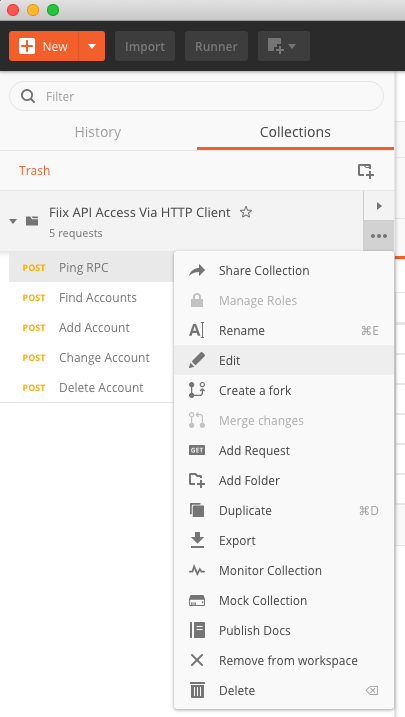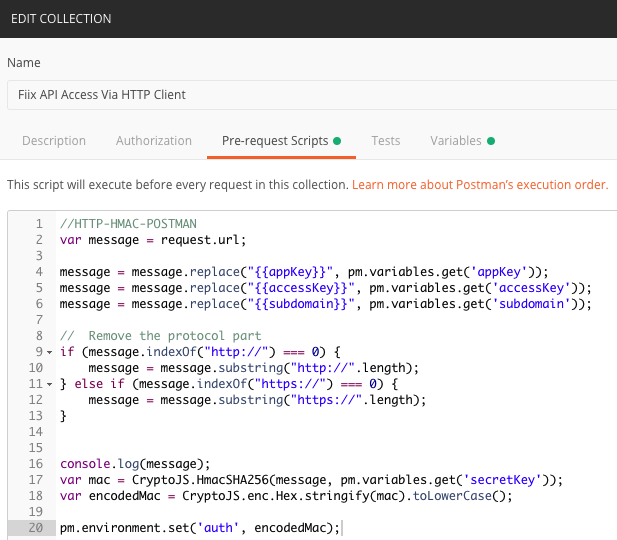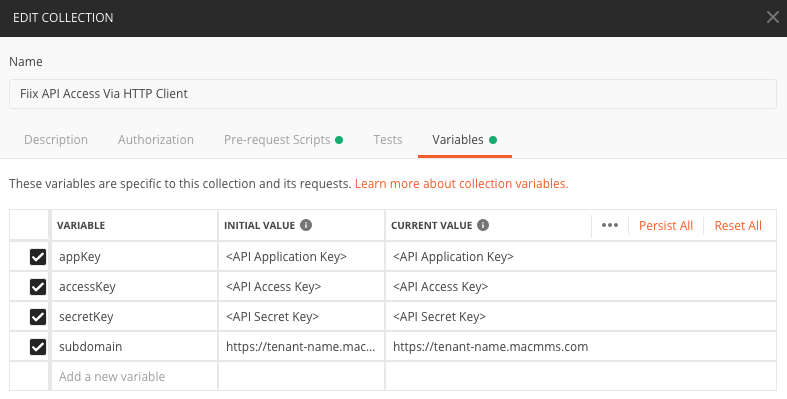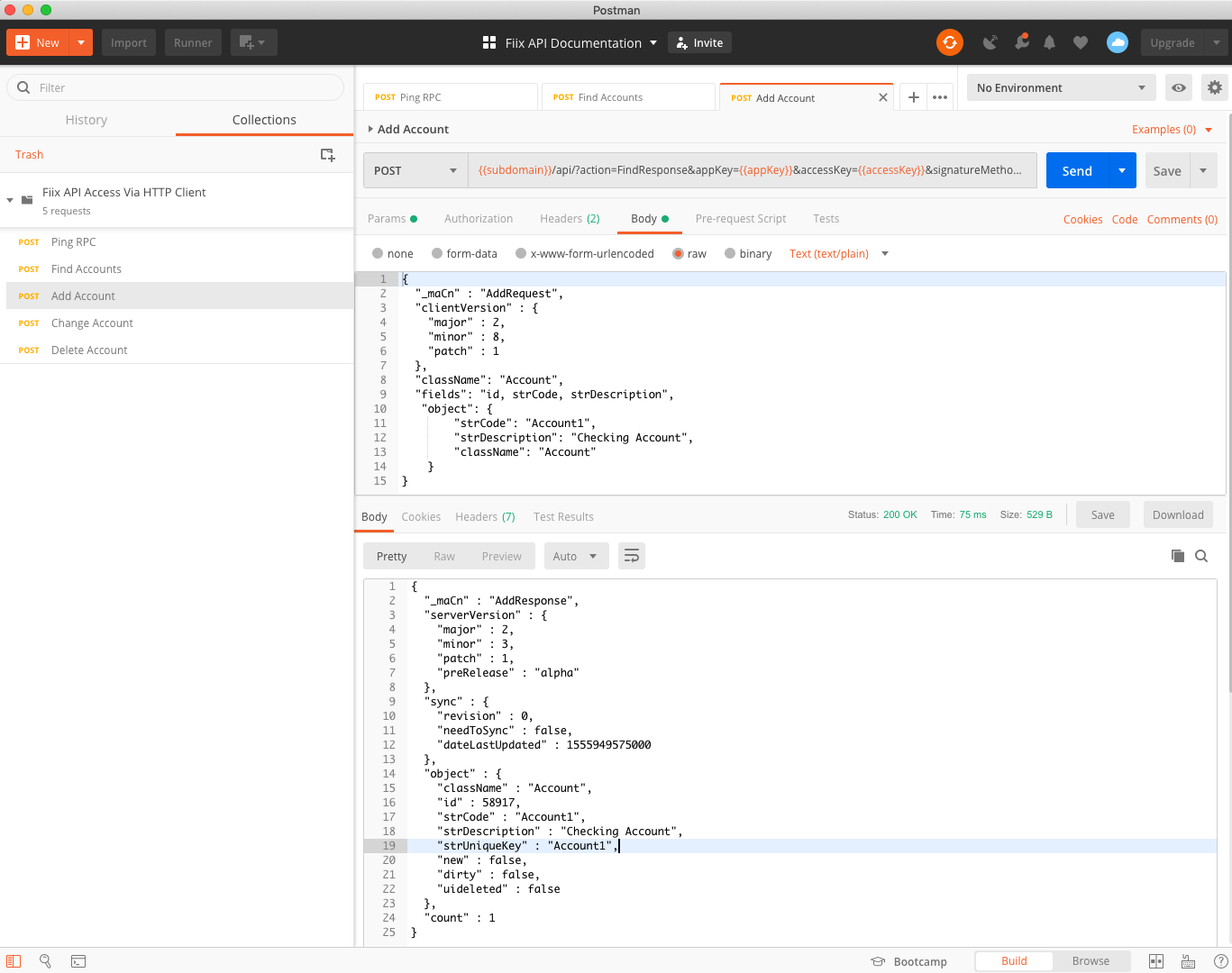How to use the Fiix API without an SDK
Table of Contents
Introduction
Fiix’s API can still be consumed without using one of our SDKs. In order to do this, this can be done by
making HTTP requests and receiving HTTP responses, and creating and parsing JSON payloads. This guide
assumes that you are familiar with making HTTP request, including defining URL parameters, request bodies,
and request headers, and receiving responses. Further it is expected you are familiar with construction and
parsing of JSON payloads.
Please note that while Fiix will frequently make changes to the API, every effort is taken to ensure that these changes are additive and backwards compliant. As such, your implementation should ignore unrecognized properties when parsing JSON.
Please note that while Fiix will frequently make changes to the API, every effort is taken to ensure that these changes are additive and backwards compliant. As such, your implementation should ignore unrecognized properties when parsing JSON.
API Request Overview
All requests to Fiix’s API have a few things in common.
First, they are all to
They should all specify the following url parameters:
All requests must use the HTTP verb
All requests must have a
All requests must be in UTF-8 encoding.
First, they are all to
https://[your subdomain].macmms.com/api/...
They should all specify the following url parameters:
| Name | Description |
|---|---|
service |
Must always be cmms |
timestamp |
The date and time the request was sent, in Unix Epoch milliseconds |
appKey |
Retrieved from your API Keys, starts with macmmsackp,
not
needed for guest/unauthenticated requests |
accessKey |
Retrieved from your API Keys, starts with macmmsaakp,
not
needed for guest/unauthenticated requests |
signatureMethod |
Must always be HmacSHA256, not needed for
guest/unauthenticated requests |
signatureVersion |
Must always be 1, not needed for guest/unauthenticated
requests |
All requests must use the HTTP verb
POST.
All requests must have a
Content-Type header with a value of text/plain.
All requests must be in UTF-8 encoding.
Authenticating a Request
Most requests to Fiix APIs require authentication. Fiix does this by verifying a signature that must be provided in theAuthorization HTTP Header.
To generate the signature, first, be sure to include the URL parameters specified above. First generate a secret spec using your api key’s secret key. Take the full URL, minus the protocol and protocol separator, and generate the hmac using the secret spec.
Most languages have libraries to generate HMAC’s, it is recommended to use a well known and trusted library for this rather than implement it yourself. The Java Fiix’s open source SDK uses to generate this is below, for reference:
//Message is request URI
String message = tp.uri;
//Trim off protocol
if (message.indexOf("http://") == 0)
{
message = message.substring("http://".length());
}
else if (message.indexOf("https://") == 0)
{
message = message.substring("https://".length());
}
//Get Message bytes as UTF-8
byte[] messageBytes = message.getBytes("UTF-8");
//Get secret key bytes as UTF-8
byte[] credentialsSecretKeyBytes = getCredentials().getSecretKey().getBytes("UTF-8");
//generate the signing key
SecretKey signingKey = new SecretKeySpec(credentialsSecretKeyBytes, "HmacSHA256");
//generate the MAC
Mac mac = Mac.getInstance("HmacSHA256");
mac.init(signingKey);
//get the signature
byte[] hmac = mac.doFinal(messageBytes);
String hmacString = new String(Hex.encodeHex(hmac)).toLowerCase();
return hmacString;
A C# example for DotNet users is below
static String getAuth()
{
String requestUri = getRequestUri();
if (requestUri.IndexOf("http://") == 0)
{
requestUri = requestUri.Substring(7);
}
else if (requestUri.IndexOf("https://") == 0)
{
requestUri = requestUri.Substring(8);
}
byte[] requestUriBytes = System.Text.Encoding.UTF8.GetBytes(requestUri);
String secretKey = getSecretKey();
byte[] secretKeyBytes = System.Text.Encoding.UTF8.GetBytes(secretKey);
HMACSHA256 hmac = new HMACSHA256(secretKeyBytes);
byte[] hashValue = hmac.ComputeHash(requestUriBytes);
return String.Concat(Array.ConvertAll(hashValue, x => x.ToString("X2"))).ToLower();
}
//Sample Request here
//You need to return the actual requestUri for Http Request
static String getRequestUri()
{
String appKey = "ABCDEFGHIJKLMNO";
String accessKey = "ONMLKJIHGFEDCBA";
String requestUri = String.Format("https://company.macmms.com/api/?appKey={0}&accessKey={1}&signatureMethod=HmacSHA256&signatureVersion=1", appKey, accessKey);
return requestUri;
}
//return appropriate secret key
static String getSecretKey()
{
return "S3CrEtK3y";
}
Request Body
All requests to the API are either CRUD Requests (CRUD stands for Create, Read, Update, Delete), or RPC Requests (Remote Procedure Call). These requests must all be in JSON and have the following common fields:| Name | Description |
|---|---|
_maCn |
For CRUD requests, the request class (e.g. FindRequest).
For RPC requests, must be RPCRequest. |
requestId |
Optional field to indicate a consumer identifier for the request. This must be a number. It should not repeat within a 10 minute window, though Fiix does not enforce this. It is useful for debugging. |
requestSentUnixTime |
The date and time the request was sent, in Unix Epoch milliseconds |
clientVersion |
An object detailing the client version. This should match to the sdk version available when you write your API integration. |
clientVersion.major |
Major version of the client. |
clientVersion.minor |
Minor version of the client. |
clientVersion.patch |
Patch version of the client. |
API Response Structure
All responses have a
Content-Type header with a value of text/plain;charset=utf-8.
All response bodies will be in UTF-8 encoding.
All responses are in JSON and contain the property
_maCn with a string
value of the appropriate response for
the request. Responses that return objects, e.g. FindResponse will contain an objects
property with an array of
the returned entities. Each of these entity representations will always at have the id
property, and a
className property defining the type of response returned. Additional
properties relevant to the response type
will also be included, details on these follow below.
Error Response
In the case of an error occurring during the processing of a request, an error response will be returned.This response will contain an
error object with the following properties:
| Name | Description |
|---|---|
leg |
Indicates which part of the request processing failed, typically this will be SERVER_REQUEST_PROCESS. |
code |
An error code. |
message |
Any message attached to the error. |
stackTrace |
A stack trace of the issue encountered. Please be sure to include this if you suspect you have encountered an issue. |
Please note that as our API is not RESTful, errors are still returned with a 200 HTTP Status. The presence of the
error object in the response object indicates whether the request was
successful or not.
CRUD Request
CRUD requests are used to retrieve or modify state within Fiix. All requests must be in JSON format, and contain the field
className. Please refer to the reference guide on the
details of these requests.
| Name | Description |
|---|---|
className |
The String representing the identifier for a specific Business Object. |
Add Request
Executes an add request, analogous to a CRUD create request, additional fields for this request are in the table below.| Name | Description |
|---|---|
fields |
The fields to be returned in the JSON Response. Each field is a String. The list is comma-separated. |
object |
The object representing the parameters to be used for the action to be run on the Business Object. |
Find Request
Executes a find request, analogous to a CRUD read request, additional fields for this request are in the table below.| Name | Description |
|---|---|
fields |
The fields to be returned in the JSON Response. Each field is a String. The list is comma-separated. |
filters |
An array of filters for restraining the query to objects matching some conditions. |
orderBy |
The field to use to sort the results. |
startIndex |
Offset used for the pagination of the results. |
maxObjects |
The number representing the limit of the number of items returned. |
Change Request
Executes a change request, analogous to a CRUD update request, additional fields for this request are in the table below.| Name | Description |
|---|---|
fields |
The fields to be returned in the JSON Response. Each field is a String. The list is comma-separated. |
object |
The object representing the parameters to be used for the action to be run on the Business Object. |
changeFields |
The fields that are to be used for the action. The list is comma-separated. |
Remove Request
Executes a remove request, analogous to a CRUD delete request, additional fields for this request are in the table below.| Name | Description |
|---|---|
id |
The id representing the specific instance of the Business object to run the action on. |
CRUD Response
All CRUD Responses share 3 common properties:
| Name | Description |
|---|---|
_maCn |
A string value of the appropriate response type for the request. |
serverVersion |
The object describing the API version with several properties, including major, minor, patch, and preRelease versions. |
error |
The object representing detailed information if the Request fails. Details include: leg, message, code, stackTrace. See the Failure Response case below for more details. |
Add/Change Response
The Add and Change responses have identical JSON structure, consisting of the added or updated object and the count.| Name | Description |
|---|---|
object |
The object representing the Response object according to the action to be run on the Business Object. This Response object may contain several properties including className, id, strDescription, strName, and more. |
count |
The integer representing the number of objects returned in the Response Object. |
Find Response
The Find responses shares a similar JSON structure.| Name | Description |
|---|---|
objects |
The array of objects representing the Response object according to the action to be run on the Business Object. This Response object may contain several properties including className, id, strDescription, strName, and more. |
totalObjects |
The integer representing the number of objects returned in the Response Object. |
Remove Response
The Response object may include the following properties:| Name | Description |
|---|---|
count |
The integer representing the number of objects returned in the Response Object. |
RPC Request
All RPC requests consist of 3 properties
| Name | Description |
|---|---|
name |
The String representing the identifier for a specific Business Object. Supported RPC names
include:
Calendar, DashboardWidget,
GetAccessibleSites, GetTimezone,
Ping
|
action |
The String representing the identifier for a specific Business Object method. |
parameters |
The object representing the properties to be used when executing the method. |
RPC Response
Upon executing a successful RPC Request, the Response returns a RPC Response object. In this case, see the below table and the code example on the right to see the returned object.
The Response object may include the following properties:
| Name | Description |
|---|---|
serverVersion |
The object describing the API version with several properties, including major, minor, patch, and preRelease versions. |
object |
The object representing the Response object according to the action to be run on the Business Object. This Response object may contain several properties including className, id, strDescription, strName, and more. |
count |
The integer representing the number of objects returned in the Response Object. |
error |
The object representing detailed information if the Request fails. Details include: leg, message, code, stackTrace. See the Failure Response case below for more details. |
File Upload
This HTTP call provides the ability to add files to Work Orders, Assets, Purchase Orders via the API. You can add either a single file or multiple files, each belonging to the same or different entity. Unlike the traditional calls, the inputs are to be sent as form data (multipart/form-data).
At least two form data parts are required in the request:
- One form-data part with the key name descriptions that uses the string data type. This form-part contains the JSON string payload of the FileDescription array, with one FileDescription object for each file you want to upload. This is common for all of the files to be uploaded and should be specified once per request. Each FileDescription object should contain the following properties.:
Note that these properties must be supplied once per file, per object you're uploading the file to. This means that if the same file needs to be uploaded to multiple objects, create one property set per object.
Property Name Description sourceInfoThis can have either of 3 values: PURCHASE_ORDER_INFOfor files that are to be uploaded to a Purchase Order,ASSET_INFOfor files that are to be uploaded to an Asset,WORK_ORDER_INFOfor files that are to be uploaded to a Work OrdersourceIdStringThe actual ID of the Purchase Order, Asset, or Work Request the file should be uploaded to. fieldNameThe key name the file will be uploaded against. See the example for details.
- The file carrying binary parts is expected to have carefully chosen, distinct key names that match the
descriptions.fieldNamein the JSON string. Note that this form-data part should be supplied for each file you're uploading.
See the example section for more information.
Further Details and Examples
Use Postman Client to access Fiix API
Please download and import the request collection in your Postman client from hereAfter importing the collection please follow the instructions below:
-
Edit the collection

-
Navigate to the pre-request scripts section and make sure it's populated as displayed below
this is where the Authorization header is computed

The script above computes the Authorization header and places the token value in a variable named auth

-
Navigate to the variables section and set the variables as per your tenant's configuration
Checkout section on How to get your API access keys ?

-
That's it, now let's fire our first API request to create an Account; a successful response should return id field of the created Account,
as show below

CRUD Example
The following is an example of an Add request sent tohttps://[your subdomain].macmms.com/api/?service=cmms
&appKey=[your app key]
&accessKey=[your access key]
&signatureMethod=HmacSHA256
&signatureVersion=1
| JSON | Description |
|---|---|
Add Request Body(Example):
|
_maCn: Specifies the request typefields: Specifies the fields that will
be added within the newclassName: Specifies the Object to be
createdobject: Provides the values for the
object, using the fields
described previously ("id" is generated and therefore does not need to be specified) |
Curl request:
|
|
Add Response Body (Example):
|
_maCn: Specifies the request type.serverVersion: Provides information
about the server returning the response.object: The newly added object.count: The count of added object(s). |
Find Request Body(Example):
|
_maCn: Specifies the request type.fields: Specifies the fields that will
be returned in search results. className: Specifies the Object type to be
searched and returned. |
Find Response Body (Example):
|
_maCn: Specifies the request type.serverVersion: Provides information
about the server returning the response.objects: The result of the search. totalObjects: The count of returned object(s) in search result. |
Filter Find Request Body(Example):
|
_maCn: Specifies the request type.fields: Specifies the fields that will
be returned in search results. filters: Specifies filter/query instructions
along side the required parameter values.className: Specifies the Object type to be
searched and returned |
Filter Find Response Body (Example):
|
_maCn: Specifies the request type.serverVersion: Provides information
about the server returning the response.objects: The result of the search. totalObjects: The count of object(s) in the search result. |
FullText Find Request Body(Example):
|
_maCn: Specifies the request type.fields: Specifies the fields that will
be returned in search results. filters: Specifies fulltext filter instructions
to be used in the query.filters.fields: Specifies the comma separated list
of fields on which the fulltext query is to be applied.filters.fullText: Specifies the fulltext search keyword.className: Specifies the Object type to be
searched and returned |
FullText Find Response Body (Example):
|
_maCn: Specifies the request type.serverVersion: Provides information
about the server returning the response.objects: The result of the search. totalObjects: The count of object(s) in the search result. |
Change Request Body(Example):
|
_maCn: Specifies the request typefields: Specifies the fields that will
be returned in response results. changeFields: Specifies comma separated
list of fields to be edited.className: Specifies the Object type to be
edited. |
Change Response Body (Example):
|
_maCn: Specifies the request type.serverVersion: Provides information
about the server returning the responseobject: Final state of Object that was edited. count: The count of edited object(s). |
Batch Request Body(Example):
|
_maCn: Specifies the request type.requests: Specifies the set of requests that are to be executed within the batch operation. fields: Specifies the fields that will
be returned in response results. filters: Specifies filter/query instructions
along side the required parameter values.className: Specifies the Object type to be
edited. |
Batch Response Body (Example):
|
_maCn: Specifies the request typeresponses: A corresponding set of responses to the set of requests in the batch. serverVersion: Provides information
about the server returning the responseobjects: The result of the search. |
Remove Request Body(Example):
|
_maCn: Specifies the request type.className: Specifies the Object type to be
deleted.id: Specifies the id of the Object to be
deleted. |
Delete Response Body (Example):
|
_maCn: Specifies the request typeserverVersion: Provides information
about the server returning the responsecount: Count of deleted object(s). |
RPC Example
The following is an example of a request sent tohttps://[your subdomain].macmms.com/api/?service=cmms
&appKey=[your app key]
&accessKey=[your access key]
&signatureMethod=HmacSHA256
&signatureVersion=1
| JSON | Description |
|---|---|
Request Body:
|
_maCn: Specifies the request typename: Specifies which RPC object to
callaction: Specifies which method to callparameters: Provides the parameters
of that said method (not required in this example) |
Response Body:
|
_maCn: Specifies the request typeserverVersion: Provides information
about the server returning the responseobject: No object is returned by this
Ping request |
Curl request
$ curl -d '{"_maCn":"RpcRequest","clientVersion":{"major":[major_version],"minor":[minor_version],"patch":[patch_version]},"name":"Ping","action":"Ping"}' -H "Content-Type: text/plain" -X POST [url]
File Upload Example
The following is an example of a request sent tohttps://[your subdomain].macmms.com/api/upload?action=uploadFile
&appKey=[your app key]
&accessKey=[your access key]
&signatureMethod=HmacSHA256
&signatureVersion=1
| JSON | Description |
|---|---|
Request Body:
|
descriptions: JSON String array of the FileDescription objectfile1: Upload the file for the Work Order from your local systemfile2: Upload the file for the Purchase Order from your local systemfile3: Upload the file for the Asset from your local system |
Response Body:
|
_maCn: Specifies the response typeuploadedList: The details of the files that have been uploaded as part of this request |
